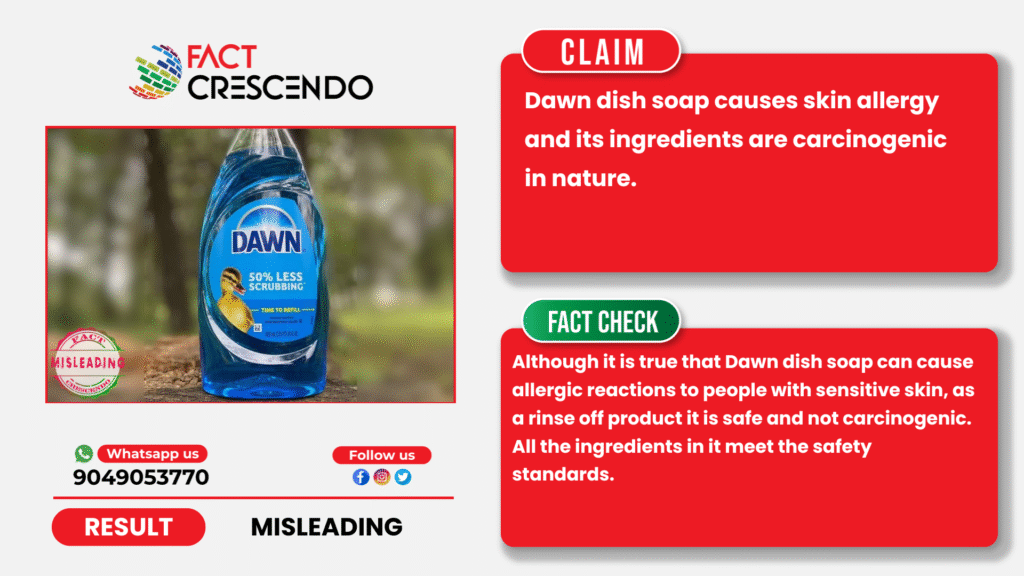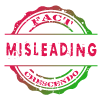
Dawn Dish Soap is a popular brand of liquid dishwashing detergent. It is widely used in households for cleaning dishes. It is owned by Procter & Gamble. However, growing consumer awareness has raised concerns about certain ingredients in the soap, such as methylisothiazolinone, sodium laureth sulfate etc.
However, Fact Crescendo found the claim to be misleading. All the ingredients in the Dawn dish soap have been approved by regulatory bodies.
What’s the claim?
Social media users are claiming that the presence of ingredients like Sodium Lauryl Sulfate, Ethoxylated anionic surfactants, Synthetic dyes, Methylisothiazolinone etc. causes allergic reactions and disrupt skin barriers. A prolonged use of this product also leads to cancer.
Fact Check-
Sodium Lauryl Sulfate:
A blog mentioned that many dishwasher detergents contain sodium lauryl sulfate (SLS), which is considered as a powerful cleaning agent that can irritate skin and eyes, leave residue on dishes, and even become airborne which affect our health or trigger allergies. After it washes away, SLS ends up in rivers and lakes, where it can harm fish and disrupt ecosystems. The blog recommended switching to natural, SLS-free dishwasher powders or making own version of safer detergent using baking soda, washing soda, citric acid, and salt to protect both your family and the environment
The U.S. Environmental Protection Agency (EPA) released a fact sheet which shows that the EPA reviewed lauryl sulfate salts (such as sodium and ammonium lauryl sulfate) as part of its pesticide re‑registration process in the early 1990s. The EPA determined that these substances possess a low risk to human health and the environment when used as directed. The organization had concluded that existing safety measures and regulations were sufficient and no additional restrictions were needed.
According to another report, the FDA had approved Sodium Lauryl Sulfate as a good additive both directly and indirectly (food packaging and coating). The expert panel reviewed the safety in 1983 and 2002 and found it safe in products that are quickly rinsed off the skin. However, if a product stays on the skin for a long time, SLS should be used in very small amounts, no more than 1%.
Sodium lauryl sulfate and ammonium lauryl sulfate had been approved to be used in cosmetics and personal care products marketed in Europe according to the general provisions of the Cosmetics Regulation of the European Union.
Here you can read FAQs related to Sodium Lauryl Sulfate (SLS).
Ethoxylated Anionic Surfactants:
The exact name Ethoxylated Anionic Surfactants is not used in the list of ingredients in the Dawn dishwash. One of the ingredients Sodium Laureth Sulfate (SLES) falls under the category of Ethoxylated Anionic Surfactants.
Sodium Laureth Sulfate (SLES) is considered safe for use in home care products when used within recommended concentrations and is biodegradable. The recommended concentration of SLES in dishwashing liquid formulations is typically between 10% and 20%. This range ensures optimal cleaning performance while maintaining product safety and stability. It can cause skin dryness or irritation to those who have sensitive skin and use the product over a long time. Accidental ingestion of trace amounts of SLES from residual soap on dishes is highly unlikely to cause any harm.
Many scientific studies have looked into the safety of SLES (Sodium Laureth Sulfate) and SLS (Sodium Lauryl Sulfate). The claims that they cause cancer are not supported by evidence, and major health organizations like the WHO and EU do not list them as carcinogens. Reviews by the U.S. Cosmetic Ingredient Review panel found them safe to use in cosmetics and personal care products.
Fragrance:
The FDA explains that fragrances are used in many cosmetic and household products like perfumes, lotions, shampoos, and even in some items labeled “unscented” to mask other smells. These products don’t need FDA approval before going to market but manufacturers are legally responsible for ensuring they are safe and properly labeled. Ingredients used in fragrances can be listed simply as “fragrance” to protect trade secrets, so consumers may not know exactly what’s included. Since some fragrance ingredients can cause allergic reactions or sensitivities, the FDA advises people with such concerns to choose fragrance-free products or contact manufacturers for more information.
Methylisothiazolinone:
According to the Department of Health, Disability and Ageing, Australia – Methylisothiazolinone has the potential to cause skin allergies and has been labelled as a medium-hazard substance. But this issue can be handled with proper packaging and labelling, cautioning the consumers.
Although Methylisothiazolinone in high quantities can cause allergies, in low quantities it is declared as safe. After reviewing the products with Methylisothiazolinone, the Australian government had permitted 0.0015% (15ppm) and 0.1% (1000ppm ) of the ingredient to be used in rinse-off cosmetics and other non-skin contact products respectively.
Conclusion:
Fact Crescendo found the claim to be misleading. Although it is true that Dawn dish soap can cause allergic reactions to people with sensitive skin, as a rinse off product it is safe and not carcinogenic. All the ingredients in it meet the safety standards.

Title:Ingredients in Dawn Dish Soap meet safety standards. The product is safe to use.
Fact Check By: Siddharth SahuResult: Misleading


